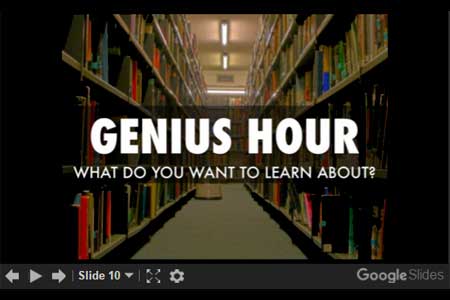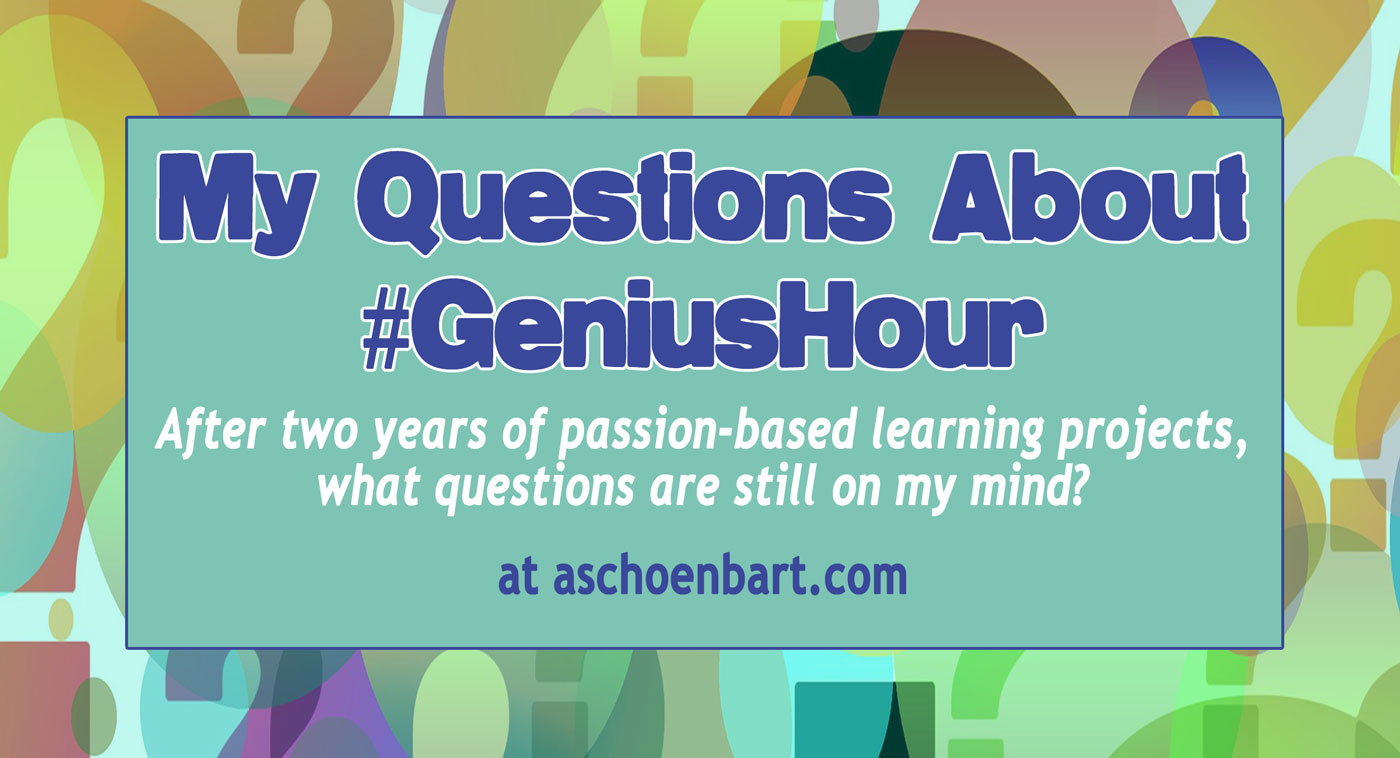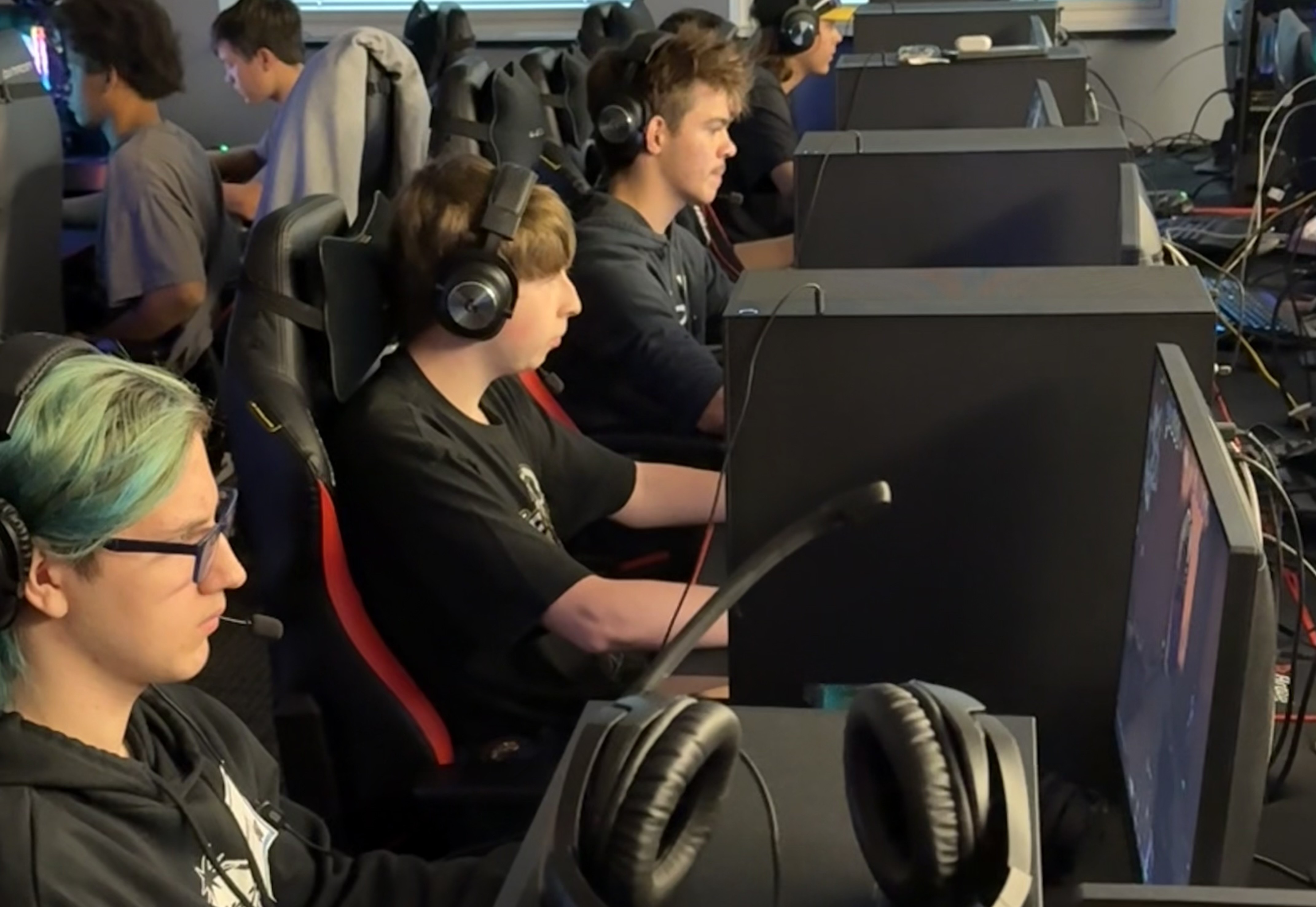My Questions About #GeniusHour


My students started presenting their #GeniusHour Projects in class today. I’ve asked them to talk to the class about their work, learning, and passion, and to share their final products. Many students created presentations, some created physical things, and a few wrote papers. The creations ranged from videos to models, and I’ll share them all here soon.
So far, I’ve been very impressed by my students’ knowledge and their ability to answer questions. While I often ask students to take notes on, respond to, and evaluate presentations, for Genius Hour, I just asked for their attention and interest. Everyone studied something they were passionate about, worked hard on, and created something cool; it’s sometimes nice to just share the accomplishments. Still, I was impressed with the conversation and questions that the presentations generated. These students learned a lot, developed genius, and knew their stuff.
As I move towards the end of this year’s passion projects, I’m left reflecting and reconsidering for next year. I like to use this space for note taking and analysis so that I can archive my successes and challenges to do it better in the future. In this post, I’ll ask and answer some of the big questions that I’m left with about Genius Hour, my planning, and my students' work. Like always, my answers are a work in progress, but they they might address some of your ideas, questions or concerns, too. If not, please ask away on Twitter or in the comments below.
After two years of passion-based learning projects, what questions are still on my mind?
Find more of my recent writing on Genius Hour check out Sharing Students’ Genius: A #GeniusHour Reflection, Developing Genius: Reflecting on Choice, Passion, and #GeniusHour, and Teaching Students to Conduct Action Research. For my students’ blogs and work, visit geniushour.aschoenbart.com.
1. Do my students learn more with Genius Hour?
Yes. Probably. What I’ve concluded is that they certainly don’t learn less and they definitely learn differently. For me, the beauty of the learning with passion-based projects (Genius Hour/20 Time--take your pick!) is that students are in charge of their own learning experiences and that their interests and skill development can be explored through any content.
My students might not be learning about literature or literary analysis (or other English class topics) right now, but their knowledge is so much deeper and more complex about their research topics and interests in ways that I could never teach. Instead of some students succeeding in the content I direct, they’re succeeded more in the content they choose, with passion, purpose, and agency. The skills are stronger, too, since I’ve tied all of the steps in our Genius Hour process to standards and English, critical thinking, research, and writing.
Tools and ideas to transform education. Sign up below.
While I can’t quite measure their learning--and I’m not sure I should want to or need to--I see it in their writing, contributions, and presentations. Genius Hour enables students to develop stronger understandings through subject-appropriate and 21st century skills, and I do think we learn more from it.
2. How should I grade and respond to Genius Hour work? Is process work feedback and grading different from the product?
This is a tough one. Should I evaluate a student’s genius or passion? Do we need to attach a grade to everything? I’m not sure I’ve worked this one out well enough just yet but I’ve tried to strike an effective balance. I’m not quite ready to throw out grades (that’s a whole different blog post) but I do want to shift the power dynamics and importance to learning and students.
To that end, this year I’ve established clear checkpoints for student work throughout the process, and graded it based on clear guidelines. Students had deadlines, models, and guidelines for blog posts, proposals, annotated bibliographies, and more. I graded them all and provided detailed feedback. My students provided feedback to each other, too.
The projects, though, are a little more complex. I wanted to value learning, critical thinking, hard work, and growth. What students proposed in February likely shifted since, and some changed dramatically. Therefore, measuring success based on the proposal seemed unfair. My solution? Once again this year, I had students evaluate themselves. With a specific and thorough rubric, they evaluated and graded their own work based on their work ethic, process work, and final products. Then, they reflected on the process in writing. This is what I graded. I evaluated their reflections for honesty, development, and critical thinking.
My students, parents, school, and our system value the grade. But I think this balance values the learning, too, by putting the onus on the student to really reflect on his or her work and to explain their successes, challenges, and progress, and really makes the learning clear.
Find my students’ #GeniusHour blogs and projects at http://geniushour.aschoenbart.com.
3. Should our work be based more concretely in the curriculum and standards?
I think that good teaching already meets the standards, whether I’m thinking about it or not. Maybe the liberal arts have biased my view, but when students are learning research skills, evaluating sources, synthesizing information, writing, and creating, they are always going to be meeting so many standards. In the future, I think a post addressing the specific Common Core State Standards in Genius Hour would be great to support what I already know: Good teaching beats the standards anytime.
I’m by no means saying to ignore standards or curriculum (but we could get rid of testing)--and I certainly do not do so. I’m lucky that teaching high school English gives me the flexibility to focus on content through skills. However, I truly believe that passion-based learning can be tied to any subject area, for any age level, and can always be designed to meet or exceed standards. We are speaking, listening, writing, reading, and thinking critically every day, along with creating, collaborating and so much more.
In the end, adapt and evolve to do better tomorrow. Take these big ideas and marry them to your own class, standards, or school policy. Empower students to explore their passions in whatever context you can. But don’t put standards before students, and their passions and growth.
4. How can I better prepare for success for all learners?
I think I had good answers for many of these questions. This is the one that gives me trouble, though.
In my two years of planning for passion-based learning, I've had a small group of students who do not complete the work. Some of them just don’t complete any work. Others fall behind and never catch up. A few have trouble with the abstract nature of finding passions. Many need guidance in shaping their plans and projects, since they vary to meet individual needs.
But because Genius Hour was a six-week process for my students, and because that process, practice, and skill development was essential in developing learning and products, there came a point where we had to only look forwards. There came a point where the few students who did not catch up on their work, accept help, or show real effort towards growth were cut off. Instead, I offered a more test-based project that was much more concrete and aligned to the class final. This argumentative essay was great practice for the state test and our next unit.
In some ways, it’s what I needed to do for these students to help them find some success and to prepare them for the next steps. But it also was no longer about passion. Everything I raved about above? Passion, agency, creativity, and empowerment? Gone.
How can I avoid this next year? How can I better prepare all students to succeed? Are all students ready for passion-based learning? What type of scaffolding could help students prepare for it?
These are some great questions. But I don’t have the answers--yet. I need more time to think and reflect, to view my students’ work and respond to it. I’ll share that work, my thoughts, and ideas from some of their reflections in the future. In the meantime, I’d love your thoughts on my questions--both the answered and unanswered.
What are your questions about Genius Hour? What are your answers? Share your experiences, questions, and reactions in the comments or on Twitter.
cross posted at www.aschoenbart.com
Adam Schoenbart is a high school English teacher, Google Education Trainer, and EdD candidate in Educational Leadership. He teaches grades 10-12 in a 1:1 Chromebook classroom at Ossining High School in Westchester County, NY and received the 2014 LHRIC Teacher Pioneer Award for innovative uses of technology that change teaching and learning. Read more at The SchoenBlog and connect on Twitter @MrSchoenbart.
